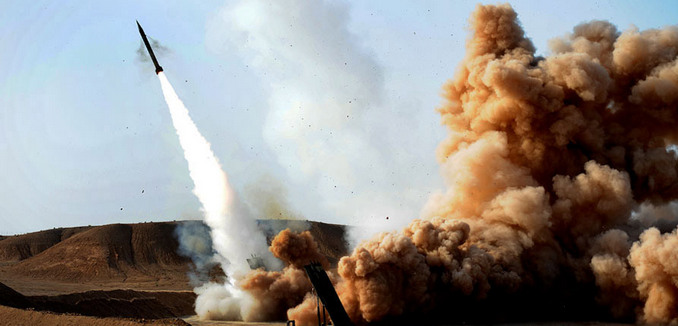Israel has been countering Iranian efforts to use suitcases to smuggle GPS components into Syria to upgrade Hezbollah’s rocket arsenal, Neri Zilber reported Thursday for The Daily Beast.
In 2017, once it appeared that Syrian dictator Bashar al-Assad would survive the civil war that was tearing his country apart, Zilber, an adjunct fellow of the Washington Institute for Near East Policy, observed, “Iran embarked on a grandiose plan for increasing its influence in the shattered country.”
Iran’s goal was to “build a force of up to 100,000 Shiite fighters from Pakistan, Afghanistan and Iraq. They built intelligence bases and an air force base within each Syrian airbase. And they brought civilians in order to indoctrinate them,” the Israel Defense Force’s former chief of staff, Gen. Gadi Eisenkot told The New York Times in January.
In addition, Zilber wrote, “Iran tried to introduce anti-aircraft systems, rockets and missiles, and a drone program.”
However, Israel countered Iranian efforts to upgrade its arsenal and those of its allies.
In January 2017, Eisenkot received government approval to increase the frequency of attacks against Iranian targets inside of Syria. Last year, Israel reportedly dropped more than 2,000 bombs on targets in Syria.
The stepped-up Israeli attacks against Iranian interests in Syria had an effect.
Israeli Prime Minister Benjamin Netanyahu told VOA Persian earlier this month that while Iran still was in Syria, “they would have been in a much greater presence if we hadn’t done it. And in fact, the presence has shrunken somewhat.”
Iran launched retaliatory strikes against Israel. Last May, Iranian forces fired more than 30 rockets at Israel. None successfully hit targets inside Israel. The Jewish State responded by striking 80 Iranian installations inside Syria.
Overall, Zilber wrote, “Israel was winning the shadow war — a point Israeli political and military leaders haven’t shied away from trumpeting in recent weeks.”
In response, he continued, “Iran was compelled to shift gears,” because Israel was destroying too much materiel that was being moved into Syria.
Lately, Iran has been trying to smuggle GPS components into Syria in suitcases. These components could be attached to Hezbollah’s current rockets and change them into precision-guided missiles.
“Bigger weapons systems are easier to track and destroy,” Zilber wrote. “The suitcases, on the other hand, can be transferred discreetly from Iran on the ground (via Iraq) or through the air into either Syria or Lebanon.”
He noted that Fox News reported in October that Iran was flying GPS components into Beirut on commercial airliners.
The only limit to these upgrades that could convert simple rockets into deadly accurate missiles are the number of GPS kits, the number of rockets, and the skill to convert them.
“They can put a missile on the building we’re sitting in now,” a senior IDF officer told Zilber. “There’s an unlimited ability to put a GPS on these rockets, it only depends on how many kits they have.”
According to a recent report produced by BICOM, Iran’s main goal right now is to convert the estimated 14,000 long-range Zelzal-2 rockets in Hezbollah’s arsenal.
To upgrade the rockets, facilities are needed. In his United Nations General Assembly speech last September, Netanyahu publicized the locations of such facilities to convert rockets into guided missiles, and Hezbollah subsequently shut them down.
In the conversion facility, sometimes mistakenly called a factory, a trained team could install the necessary GPS components into the rockets in two to three hours. They would upgrade the Zelzal “removing a middle section located between the motor and warhead, and replacing it with the internal navigation-guidance-control system,” according to Zilber.
The IDF has insisted that Hezbollah has only been able to upgrade a few rockets; though Hezbollah chief Sheikh Hassan Nasrallah claims that the terror group has managed to upgrade a much greater number.
Zilber reported that Israel has been publicizing the threat in the hope that public scrutiny of Iran’s efforts to increase its threat to the Jewish State will lead to international pressure on the Islamic Republic, Hezbollah, and Lebanon.
“That’s at least the idea, in order to avoid a massive war no one likely wants,” Zilber wrote “At present it all seems to hinge on if Iran chooses to move ahead with its precision missile gambit.”
[Photo: Mohammad Sadegh Heydari / WikiCommons ]




